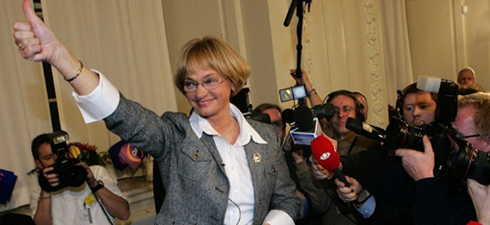The bridge-tunnel between Copenhagen and Malmö is remarkable feat of engineering, but for the many Danes forced to live in Sweden who cross it to commute to jobs in Copenhagen, the Öresund bridge is a symbol of social exclusion. Every day they are obliged to pay a toll to enter their own country, where they cannot live because they have a foreign spouse. Danish immigration law is notoriously strict, especially for asylum seekers.
Marriage with a foreign partner aged under 24 is not recognised, and a points system has now been established for immigrants wishing to obtain a residence permit. Immigrants must provide evidence to show that they have "actively participated in Danish society" for at least one year. And Danes with foreign spouses are obliged to prove that as a couple they have a combined attachment to Denmark which is greater than their "combined attachment to any other country."
It was on this basis that tax inspector Bolette Kornum was denied permission to move back to Copenhagen with her Egyptian husband: the immigration service ruled that they had a greater attachment to Egypt. Bolette speaks Arabic, her husband had no family in Denmark, and they had lived together for several years in his native country. Go and live in Egypt was the official response.
"All my life I have paid my taxes, and now I am not welcome in my own country," says Kornum, who counts among the population of 6,000 families that live on the other side of the Öresund bridge — a situation which she insists "destroys people's lives."
Pressuring the government
With only a small number of left-wing movements continuing to oppose it, Denmark's harsh immigration law benefits from a tacit consensus between virtually all of the country's political parties. The promoter of this legislation, the Danish People's Party (DF), which has become a permanent and influential presence on the country's political landscape, is no longer considered to be an extreme-right party, nor is it rejected as such. But how has succeeded in shaping public policy?
In 2001, when the DF won 12% of the vote in general elections, it was widely seen as a pariah in political circles, where it was vilified by the left, and systematically taken to task for its populist rhetoric and its anti-immigration stance. However, the outcome of the election, a typically Danish minority coalition between conservatives and liberals, paved the way for its rise to power. In return for shoring up the centre-right government in parliament, the DF demanded the implementation of draconian anti-immigration measures.
The members of the coalition were convinced that they had obtained a bargain that would enable them to govern while cutting the ground from under the feet of the DF, but the reality was quite the opposite. In fact, they had been manipulated. The DF was now free to exercise its influence on two parties that depended on its support, while refusing to form part of the government.
It was an ingenious strategy: "Effectively sheltered from executive responsibility, it became the most professionally managed of all the political parties and made use of the best communications consultants. It is now the most efficient political machine in Denmark," affirms Politiken political columnist Peter Mogensen.
Left-wing, anti-Islamic and Europhobic
On the occasion of annual budgetary negotiations, the DF has been able to use its veto to obtain tactical victories that are easy "to sell" to its electorate: i.e. the construction of a hospital in a region with a lot of potential DF voters, or a much vaunted one-off payment for over-65s. On social issues, the DF is largely situated on the left and supports the preservation of the welfare state.
It is openly anti-Islam and anti-immigration, but a strong proponent of measures to benefit pensioners and the handicapped. In the field of external relations, it is Europhobic and an outspoken opponent of Turkish accession to the EU, but at the same time staunchly pro-Israeli. Its procedures are marked by a rigorous discipline designed to prevent any infighting, and to root out racists and neo-Nazis, who are regularly expelled from the party.
Party leader Pia Kjærsgaard has come a long way since she founded the DF in 1995. Initially antipathetic and highly critical of other parties with whom she sought to enter into conflict, she has since adopted a conciliatory approach: "She is very careful to avoid offending parliamentary colleagues," notes Henrik Kaufholz, a director of the Danish investigative journalists association.
Taking advantage of the shelter offered by the minority government, over the last ten years the DF has built a reputation as a reliable and influential political partner. It has also expanded its voter base to the point where it can now count on the support of 14% of the electorate. But regardless of the number of votes it obtains, the DF can already claim that several of its ideas have now been adopted by Denmark's mainstream political parties.
© De Groene Amsterdammer
Was this article useful? If so we are delighted!
It is freely available because we believe that the right to free and independent information is essential for democracy. But this right is not guaranteed forever, and independence comes at a cost. We need your support in order to continue publishing independent, multilingual news for all Europeans.
Discover our subscription offers and their exclusive benefits and become a member of our community now!












